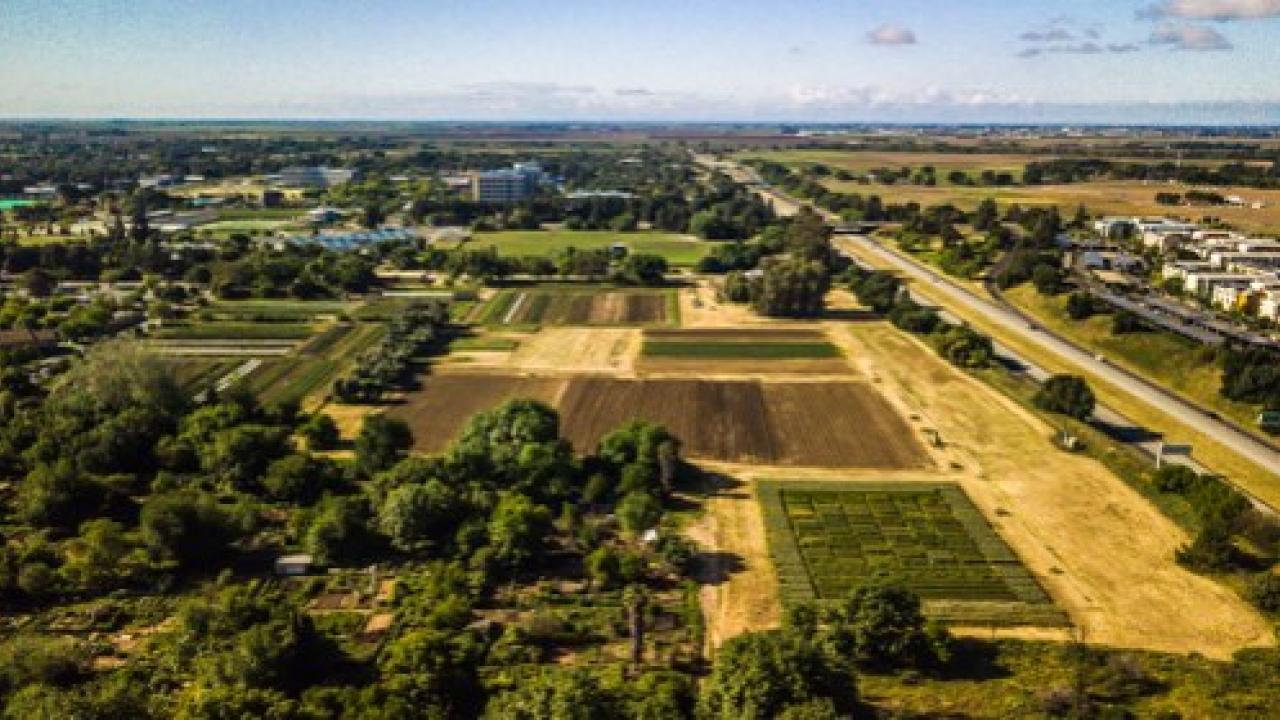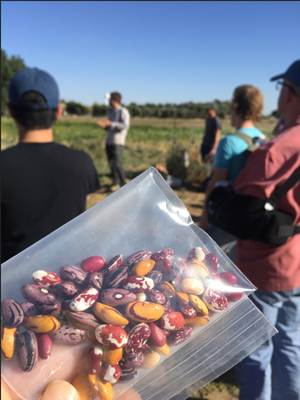
Student Farm Promotes Experiential Learning through SCOPE
The Student Collaborative Organic Plant Breeding Education (SCOPE) project is a student-led collaborative of faculty and student plant breeders working with local organic growers on improving crop varieties for organic farming systems in Northern California, with the possibility of future expansion to other regions. Using traditional, field-based plant breeding methods, new varieties of heirloom-like tomatoes, jalapeño peppers, bell peppers, pest resistant common bean, and lima bean are being developed on certified organic land at The Student Farm at UC Davis.
On a warm morning this past July, I walked into a tomato field at the Student Farm where a group of students and a recent UCD Postdoc in Agronomy and Horticulture were evaluating new tomato lines. The group was a student-led collaborative of faculty and student plant breeders working to improve crop varieties for organic farming systems called SCOPE (Student Collaborative Organic Plant Breeding Education).
Laura Roser (Sustainable Agriculture and Food Systems, Class of 2019) joined the SCOPE project in 2017 as an intern. She’s now a student employee leading teams of new interns.
“I like working on SCOPE because there are so many different experiences that I probably wouldn't have gotten on another project … I've started to teach new interns and explain to them the breeding goals for each crop. Taking a leadership role has been really important in building my confidence, my teaching skills and my ability to communicate effectively,” says Roser.
The Student Farm emphasizes experiential learning and student leadership. This is true, too, for the current research and experimentation efforts underway at the farm.
Graduate students leading the project have similar experiences. Travis Parker is a Plant Biology PhD candidate leading the development of new high-quality heirloom-type common beans that fix nitrogen, have a long shelf life, reduced virus susceptibility, and consistent yields. Parker says that, “The SCOPE program is totally integrated into my graduate school research and experience … Through the SCOPE project, I've learned a huge amount about plant breeding and managing a team successfully.”
Saraah Kuzay a graduate student co-leading the SCOPE pepper team explains, “By breeding crops for organic systems the SCOPE project is meeting a much-needed product for the organic community. While organic produce is well accepted and organic farms thrive throughout CA, there are few if any cultivars bred for organic systems. Meaning that most seeds, even organic certified seed, were developed for conventional farming systems that have very different growing and soil conditions compared to organic farms.” Roser, the undergraduate working on the project adds, “What I value most from the experience is being part of a project that has real purpose.”The SCOPE project was designed with these kinds of outcomes in mind. Prof. Charlie Brummer, the faculty lead on the project, says that he “wants to ensure that our students, both graduate and undergraduate, have opportunities to learn about practical aspects of plant breeding while also addressing the needs of organic growers.”
If you visit the Student Farm in summer you’ll see the project’s peppers, tomatoes, common beans and lima bean trials. You’ll also see the stubble from high quality winter wheat lines being developed by Allison Krill, a researcher with UCD’s Department of Plant Sciences. David Kaisel, a specialty grain grower and miller with Capay Mills says that, “Allison’s work with small grains is the most immediate way we can ensure that the grains we’re growing respond to the needs of our customers. I work directly with some of the most talented and influential bakers and chefs in the country, who are becoming aware of the unique characteristics of specific wheat varieties, and who ask for them by name. By engaging growers and millers in her work, Allison (and UC Davis more broadly) is creating a virtuous circle of collaboration between end-users (bakers/chefs), producers (growers and millers), academic researchers (Allison), and seed companies.
Of his visit to the Student Farm, David says that, “In the case of small grains trials, the Student Farm offers small independent growers like me an opportunity to observe how different grain varieties perform under a range of soil, fertility and irrigation regimens, more than I’d be able to do on my own. The Student Farm is a great community resource for learning and experimentation.” Indeed, learning and experimentation has strong historical roots at the Student Farm; the farm was founded on students interested in exploring what they called at the time “alternatives in agriculture” and what we now call sustainable agriculture.
The SCOPE project and Allison’s wheat breeding efforts fall in line with these early efforts. As do other research projects: an Entomology PhD student’s interest in studying how fear ecology impacts alfalfa herbivory; an International Agricultural Development Masters student’s interest in experimenting with no-till vegetable crop systems at the farm; a Community and Regional Development Master’s student desire to document and critically analyze the Student Farm’s food access project, and group of undergraduates testing a new composting method they learned on a study abroad trip. In this way, and through our commitment to education and extension, the UC Davis Student Farm will continue to contribute to UC Davis’s land grant mission.